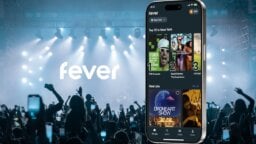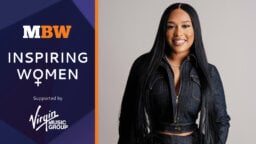MBW’s Inspiring Women series profiles female executives who have risen through the ranks of the business, highlighting their career journey – from their professional breakthrough to the senior responsibilities they now fulfil. Inspiring Women is supported by Ingrooves Music Group.
Amy Davidman is one of five founding partners to have joined forces to launch new US-based talent agency TBA. It’s a brave move in the middle of the pandemic, but one which she’s found freeing.
“I’ve had to really think about what the definition of work means because I’m working, but it’s not generating income,” she explains. “At the same crossroads, you’re not doing it the way that you did it before so the conversations can then get more creative and open about what my role is for an artist and how can we help each other, how can we do whatever is possible.
“It’s a little bit like a double-edged sword, it’s challenging, for sure, but it’s also where some of the more creative conversations happen that maybe wouldn’t have happened before.”
TBA is one of a few independent agencies to have been born following layoffs at major agencies, in this case, Paradigm. Davidman brings acts including Pink Martini, Hiatus Kaiyote, José González’s, Cut Copy, Cuco, Helado Negro and Ana Tijoux to the company.
When asked what TBA offers that’s unique, Davidman says: “A refreshing new outlook on the future”. She continues: “I’m not saying that there aren’t people in some of the bigger agencies that may have that outlook as well, I just know that we’re trying to do it from a full agency perspective and not necessarily just each one of us [operating] as [lone] agents.”
Davidman started her career as an office manager at a nonprofit arts organisation before hearing about an opening at the Bowery Ballroom, just as she was about to throw in the towel on her time in New York.
She loved music and the venue, got the job, and made lots of contacts that eventually led to her joining High Road Touring as owner and agent Frank Riley’s assistant, where she had a five-year apprenticeship in the agency world.
After moving to Chicago, Davidman, who had met Tom Windish during her days at Bowery, joined The Windish Agency as an agent and completed her practical education on the job.
She remembers: “Tom handed me part of his roster to help book and I just sat next to him for I don’t even know how many months, and it was just like booking school. He would be like, ‘Okay, route this tour, what does it look like? Go to this venue, go to these people.’ In real time, I could just ask him, ‘What do I do next?’”
In 2017, The Windish Agency was brought into Paradigm, where Davidman was until September last year. Here, we chat to her about biggest lessons learned in her career, the evolving role of an agent, what she’d change about the music business and why, and the advice she’d offer to anyone starting her career today.
Across your career so far, what are the biggest lessons you’ve learned that shape the way you operate as an agent today?
I do feel like as I’ve aged, and as I’ve become more comfortable and confident with myself, I truly feel like owning that my way is great and good enough. I’ve definitely learned things from mentors that have helped shape my view as an agent — Frank taught me how to have a zen approach to booking, for example. There can be these really frenzied, stressful times when you’re trying to get things right and make things work, and he always had a calm approach.
Tom was potentially completely the opposite! He was very assertive and aggressive, like, “If you want it to be like this, go get it, jump in, don’t wait for somebody to say they need a tour, go to them and say ‘Let’s strategize, put things in place and plan super far out.’”
I took things from both of those approaches and over the years, have blended them with my own style. Something that has become even more apparent in starting my own agency with my colleagues is [the importance of] having a strong belief in yourself, that ‘I can do this, I’m good at what I do and I can be good at what I do the way that I do it’. That’s what I’ve thought a lot about in the last year.
How is the role of an agent changing now and where do you see that going, when, fingers crossed, everything gets back to normal again post pandemic?
As an agency, we’ve talked about being a little bit more of a full-on partner for a manager or an artist, to not just look at touring, but to look at everything creatively and say, ‘Where can we help and where can we help to strategize?’ Maybe that is just trying to be a lot more connected with not only the management conversations, but the label conversations and the publicist conversations, and when certain assets are going to be coming out, and how that is going to then play alongside any other content or visibility.
“As an agency, we’ve talked about being more of a full-on partner for a manager or an artist, to not just look at touring, but to look at everything creatively.”
[We could work on] a brand campaign, a conference, a speaking engagement or some other deal that is income generating and that can go alongside what we’re hoping to plan out for the touring world. It’s about trying to be as flexible as possible.
What’s the definition of a good agent?
Every artist is different, and every team is different, and goals also vary. I have a really eclectic roster and it means that there are wildly different plans in place for many of them. So I think it’s really important to look at every artist’s plan with fresh eyes and be able to be open to the idea of being creative.
It’s about seeing what the goals are and sometimes working backwards — not only do I want artists to be able to grow their platforms, their engagement and their fans, but I also want to strategically look at who those fans are or who they could be, which might result in a different approach.
If you’re blowing up on TikTok, maybe touring is going to go in one direction, for example, but if you feel more like you’re tied to your own activism and place in the cultural landscape, is there a different way to monetize that in terms of what kind of performances or venues you might be going after.
The live industry has obviously gone through a huge change over the last year. Do you see the pandemic having a longer lasting impact on the way that the industry operates going forward?
I think that a lot of people want to go to concerts. I do think there may be a little bit of analysis, when gatherings are possible, to look at if people are more open to buying a $15 ticket rather than $75 ticket, for example, and I don’t know if we’re going to know that for a while.
There’s probably going to be longer-lasting conversations about force majeures and contracts. Everybody’s trying to protect themselves and I’m trying as best as I can to highlight the fact that we’re all trying to survive here and we’re all trying to be human beings and do the right thing. The problem is that I think most promoters agree with me but that doesn’t necessarily mean they’re going to change their legal language.
On paper, they are still going to protect themselves, but then say to me, ‘Of course we’re going to do our best to come to an agreement if something happens’. I really hope for that but I think that we all are going to have to use language that everybody feels comfortable with. That’s going to be part of negotiating moving forward that might be a little bit difficult.
What would you change about the music industry and why?
There’s a more urgent need for more people to take diversity and representation seriously. Off the heels of last year, it would be really unfortunate if the industry as a whole didn’t make more progress moving forward. I know it’s not necessarily something that can be changed immediately but I think that there are things that can start happening, and conversations that can be had, and small changes with longer-term goals that will hopefully create systemic shift over time.
“Off the heels of last year, it would be really unfortunate if the industry as a whole didn’t make more progress [on diversity and representation] moving forward.”
What are some of the small changes that you’d like to see?
Right now, one of the first things that we’ve done is partnered with an organisation called Diversify The Stage. We’ve been in talks with them about their mentorship and internship programme, and we’ll be getting at least one intern from their current cohort and then continuing to work with them.
There are other things that are on the back-burner, whether it’s mentorship programmes with other organisations, or collaborations with other nonprofits who are working with high school students. I do think that job training, getting applicants into the pool and hiring rules are really important.
I would love to be part of helping any young people get a foot in the agency world or have the opportunity to see if that’s something they would be interested in. I have my fingers in a few different pots trying to figure out what the next step is with that.
What advice would you give to a younger version of yourself or someone who is starting out in the agency world today?
I do think that probably people told me this, and I ignored them, but there’s so much that happens in this industry based on who you know, which is part of this big [diversity] problem that we have. So at every point along the way, I would say form those connections with people you’re meeting — start a spreadsheet of who you met, when, why and how to follow up with them to stay connected. Meeting people and connecting is so important in this industry in terms of people remembering you, working with you and listening to what you have to say.
Often I see a lot of young people think about networking as needing to meet people who are in positions of power within the industry and I actually think that what doesn’t happen often enough is peer-to-peer networking. All the people who were assistants when I was an assistant, now they’re running festivals and are presidents of major companies and I’m not necessarily in as close touch with some of those people as I should be.
The people who are at your level will grow in the industry alongside you and that is such an important relationship. It can open up doors down the road that you wouldn’t even realize.







